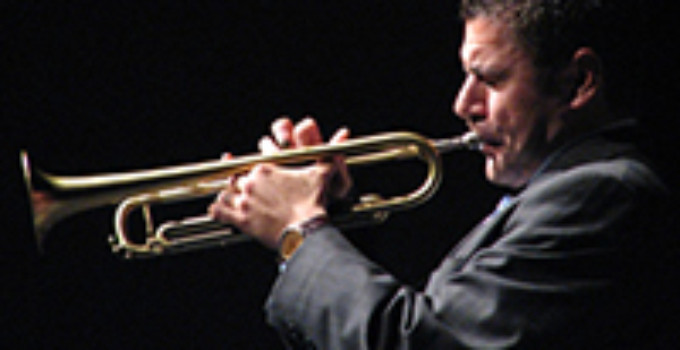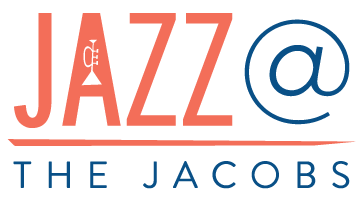Interview: Gilbert Castellanos, Trumpeter, Curator of Three Jazz Concert Series, and Founder of The Young Lions Jazz Conservatory

It's a marriage committed to musical excellence. Jazz trumpeter Gilbert Castellanos says of his wife Lorraine, "She's a classically trained guitarist, and her practice can be intimidating at times." That helps motivate him to practice more, usually four or five hours a day. But she has said, his practicing inspires her to practice more because she feels guilty if she doesn't. Fortunately for the couple, and perhaps the neighbors, they both have successful careers that prevent them from escalating into a friendly, but potentially fatal competition.
I got an idea of the extremes a practice competition might go to when Castellanos explained why he no longer teaches at Los Angeles's USC Thornton School of Music. He'd leave San Diego at five in the morning and return at one the next morning. He did that two or three times a week for 12 years before finally deciding--maybe it was taking up too much time?
In an hour conversation by phone I learned how Castellanos came to practice as he does, what jazz means to him, and the training and experience that have led to a highly satisfying career.
He began piano lessons at age five and got his first trumpet at six. The importance of practice was instilled in him by his father. Though himself a multi-instrumentalist and band leader, "He also ran an upholstery business out of his home, so there was no way of me saying, 'Oh yeah, father, while you were at work today I practiced five hours.' He was always there, so I literally had to practice five or six hours a day.
"When I was 11, I played the American and Mexican national anthems as an opening for my father's Afro-Cuban band and got to play in the band at the concert too. My father paid me like a regular, and a light bulb went off. I thought, hey, this is the first time I've had this much money in my hands." After working hard to learn his father's charts, he began to form his own groups. And in 7th grade, "We didn't have a jazz program. I convinced my band director to start one."
His jazz chops developed rapidly. He was just 15 when he performed at the Monterey Jazz Festival with trumpeter Dizzy Gillespie, who became a mentor. "He was extremely encouraging. To this day I still think he was responsible for helping me get a scholarship to the Berklee College of Music in Boston." After Berklee, formal training continued at Cal Arts in Los Angeles.
Castellanos first received national attention in his twenties when he recorded three successful albums with a combo called Black/Note. A lot has happened since then. Today he performs often with various groups led by himself or friends, runs a jazz conservatory, curates jazz programs for the San Diego Symphony and the San Diego Museum of Art, leads open-to-all weekly jam-sessions at two venues, and works on UCSD's summer jazz-camp with its founder Dan Atkinson. Castellanos has won the San Diego Music Award for best musician several times, and last year received a "Jazz Hero" award from the Jazz Journalists Association.
Like his practice routine, Castellanos's love for jazz was inspired by his father. "He had a huge LP collection. That's all I listened to when I was a kid." He made cassette recordings of Basie, Clifford Brown, "Fats" Navarro, and many others. Uneasy about sleeping in the dark alone in his own room, he used jazz to ease his fears. "At that stage of my life I would listen to jazz every night on a player under my pillow." The night before my interview he had spent the entire evening at home listening to his own collection of LP jazz classics, surprising friends with a rare 10-inch disc recorded in 1954 by trumpeter Clifford Brown.
Passionate about keeping the jazz tradition he came to love alive, he founded The Young Lions Jazz Conservatory in 2013. There will be 100 students ages 10-18 in the class entering this fall. In addition to running the nonprofit organization, Castellanos is one of its instructors and a mentor to students. He pushes them to take practice as seriously as he does, telling them, "When I was your age, this is how I started out. I had to learn to play the Blues in all 12 keys. When you can do that we'll go to the next stage."
Performance opportunities for students are also a priority. He feels especially good about the Panama 66 sessions at Balboa Park's museum of art. "It's gone beyond my expectations. The young Lions play from six to eight, followed by my jam session from 8:30 to 11:30. The output of support from the community is just incredible. We get over 200 people every week." Students have also performed before the main acts he books for the San Diego Symphony at the Jacobs Music Center and the bayside Embarcadero. Referencing Wynton Marsalis's New York success, he calls, "The combination of Jazz at the Jacobs and the Young Lions Conservatory Lincoln Center West." His dream is to have a permanent performance venue for both the Young Lions and established jazz musicians.
I was pleasantly surprised a few years ago when I learned of incoming Symphony  CEO Martha Gilmer's interest in adding more jazz to the organization's programming. Then, given the popular preference for rap and rock, I was amazed when Castellanos managed to make the concerts she encouraged a huge success! She told him to "dream big" and bring the people that inspired him. So he did. He books, "My idols, the people I grew up listening to on record, musicians I would love to see on stage, musicians I really look up to and respect."
CEO Martha Gilmer's interest in adding more jazz to the organization's programming. Then, given the popular preference for rap and rock, I was amazed when Castellanos managed to make the concerts she encouraged a huge success! She told him to "dream big" and bring the people that inspired him. So he did. He books, "My idols, the people I grew up listening to on record, musicians I would love to see on stage, musicians I really look up to and respect."
"And I had a great experience a few weeks ago--standing room only at the Blue Whale in Los Angeles for a tribute to Lee Morgan. It was an all-San-Diego group I put together to show the Los Angeles community how we do it down here. I think people were blown away, and it reminded me of why I love it here and haven't moved to other major cities. I believe San Diego is going to be a major hub for jazz in a few years."
Despite everything else going on, there's still that four hours or more of practice each day. He warms up for 90 minutes. "Yeah, I wake up and go to my long tones for 40 minutes before my cup of coffee. It's me stretching out like an athlete. I have to do that every day. It's my day job. I look at scales as colors, and apply them to my music, and that's how I teach the kids too. I know what I'm going to practice before I go into my session. Like, for example, sometimes I call them blue or red days. Blue might be just etudes and classical inserts. Maybe I'll just work on diminished patterns for an hour. My red days I focus on jazz, transcribe a solo or write out an arrangement, or just practice jazz etudes."
Practice sessions and concerts lead to "warm downs." "If you've had a rough day, a three-hour rehearsal and a three-hour concert, you have to loosen up afterwards. Especially a brass player. You're going to be a little swollen. After a concert you might want to talk to your fans, talk to your musicians. I disappear into a corner for ten minutes or so, and play long tones as soft as I can, and pedal tones" (tones below the normal trumpet range and tough to do correctly).While most brass players warm up, not all warm down. Castellanos said that one of his idols, Freddie Hubbard, didn't, "He never warmed up either, and that's why, as he got older, he wound up really damaging his embouchure."
Unlike anyone else I've ever spoken to, Castellanos says he never gets nervous when he performs. But he can become flustered when not performing. "Nerves only get to me when I don't have my horn. Like when I'm at a social gathering talking to someone. I remember one time I was at a grocery store buying some stuff. I had a cartful, and this older women cane up to me, and was like, 'Oh, Gilbert! How are you doing?' It caught me off guard to the point where I got so freaked-out that I left my cart there. Got in my car and went home!"
In spite of his success and obvious skill Castellanos is far from complacent. When I complimented him on his tone and technique, he reluctantly admitted his sound was, "You know, it's getting there. Sound is the most important thing to me. It doesn't matter how fast or high or loud you can play. A warm beautiful sound is what people remember. I'm going to be a student of this music the rest of my life. There's no way I'm ever going to master jazz, or even the trumpet."
Both Gilbert and Lorraine have grueling time commitments, but it hasn't affected their relationship. "Lorraine's my best friend. We do everything as a couple. If we're not making music together, we're out doing other things together. We don't have kids, except for two furry ones, a Doberman and a cat.
"I'm a lucky man to have someone who supports what I do. She's a musician. She gets the lifestyle. It's a big plus."
It helps with the practice schedule too, Lorraine has been quoted as saying, "Our dog Nina is maybe not so fond of the trumpet, especially the high notes. But she's the only one."

The 2018 Bayside Series summer jazz series is far from over. Go to the San Diego Symphony website for concert schedules. Gilbert Castellanos's is already thinking about 2020.
Photos courtesy San Diego Symphony
Play Broadway Games
Videos





%20(1024%20×%20512%20px).png)